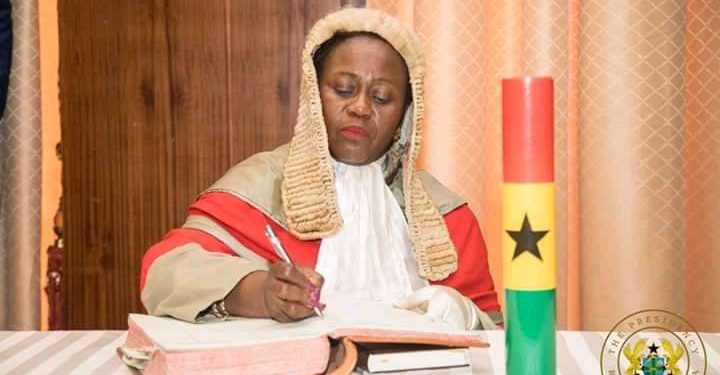The Judicial Service of Ghana under the leadership of Lady Chief Justice, Justice Gertrude Araba Sackey Torkornoo has announced that over the next five years, the service will work to ensure that every district in the country gets a court to efficiently decentralise the adjudication of justice in the country.
In an interaction with the Judicial Press Corps (JPC) today, Friday, 2 August 2024 in the media briefing room at the Law Court Complex, the Chief Justice and some directors of various departments including Archives, Information and Communication Technology (ICT), Monitoring and Evaluation, as well as the Judicial Training Institute (JTI) pointed out that the service is on course to achieving its target of modernizing the country’s Judiciary.
As part of the media engagement, the judicial service directors took turns presenting recent developments and their plans to the JPC. The directors who presented at the gathering were the director for monitoring and evaluation, Papa K. Maisie, deputy director for archives, Mr Moses Owereko, director of ICT, Mr Noble K. Nutifafa, and a representative of the Judicial Training Institute, Ms Perpetual Quarshie.
Increasing number of courts
The director for monitoring & evaluation, Papa K. Maisie, in his presentation, indicated that the total number of courts nationwide currently stands at 468. The breakdown he said is as follows; Supreme Court, 1, Court of Appeal 6, High Court, 129, Circuit Court, 104 and District Court, 228. He explained further that between the 2022/2023 legal year and the just-ended 2023/2024 legal year, there has been a significant increase in the number of courts in the country.
“The Supreme is one and it remains so, however, the Court of Appeal was three but an additional three have been added to increase the number to six, representing a 100% increase. The country’s High Courts were 125 at the end of the 2022/2023 legal year but an additional two have been added to make it 127 representing a 1.6% increase,” Mr Maisie said.
“Circuit Courts were 97, and six more have been added bringing the number to 103 representing a 6.2% increase. District Courts on the other hand were 208 and 20 more have been added bringing the number to 228 and representing a 9.6% increase,” the director for monitoring & evaluation, Papa K. Maisie added.
The Judicial Service under the leadership of the Chief Justice is exploring the possibility of establishing at least a court within every district in the country in the next five to ten years,” Mr Papa Maisie, the director for monitoring & evaluation at the Judicial Service further stated.
Gender balance and judges
With the passage of the Affirmative Action Bill in July 2024, it has become extremely important for the country to ensure a balance between males and females in all aspects of social and national life. To this end, the Judicial Service says in the 2021/2022 legal year, the number of male Judges/Magistrates was 221.
“This figure increased by 7.7% in the next legal year (2022/2023) but reduced in the subsequent year (2023/2024) thereafter by 6.3% from 238 to 223. The female Judges/Magistrates, on the other hand, have had an increase in their number from the 2021/2022 legal year to date, Mr Maisie, the director for monitoring & evaluation remarked.
“A 12.4% increase from the legal years 2021/2022 to 2022/2023 (194 to 218) was followed by a 0.9% increase from the legal years 2022/2023 to 2023/2024 (218 to 220). As of the end of the 2023/2024 legal year, female judges stand at 220 (49.7%) and male judges are at 223 (50.3%),” He further remarked.
Suit numbering/published judgments
Mr Maisie also disclosed that the 2024/2025 legal year will adopt a new standard alphanumeric suit numbering system which will have the; “Region, Town, Court Identifier, Case Type Identifier, Serial Number, and the Year of Filing.” A typical suit number will be as follows; UE/BG/HC/E5/06/2020.
He also indicated that the Judicial Service has signed an MoU with African Legal Information (AfricanLii), an online (www.africanlii.org) platform that publishes laws from African countries to help with research as well as ensure sustainable open access to decisions of Ghanaian courts. The same he said is also available on www.ghalii.org, a Ghanaian version. He added that thus far, 11,710 judgments have been uploaded to portals.
Archiving transformation
Deputy director for archives, Mr Moses Owereko in his presentation pointed out that the Judicial Service has basically, two types of documents created in the service and they are dockets and administrative documents. Over the years, both documents have been poorly achieved leading to the loss or damage of some vital records.
However, under the direction of the Chief Justice, the archives and documentation department of the service has started transferring all existing documents into standard storage boxes. The process has been carried out at the District Court, Kaneshie, Main Archives, head office, head office strong room, the TDC District Court, Tema, the Law Court Complex, and the High Court in Cape Coast. The process according to Mr Owereko, will continue until all courts in the country have been properly archived.
Automation of courts
Out of the total number of 468 courts in the country, the director of ICT at the Judicial Service Mr Noble K. Nutifafa in his presentation, said 228 courts have been automated. To this end, the service has fully operationalised its e-justice system which essentially deals with e-filling, e-payments, and document requests. As of July 2024, Mr Nutifafa disclosed that a total of 71,781 cases have been filed by applicants using the e-filing system.
Small claims/debt recovery court
The Chief Justice, Justice Gertrude Araba Sackey Torkornoo after the presentations of the directors summed up the session with the Judicial Press corps by registering her appreciation to the directors for their efforts aimed at making access to justice a smooth process.
She indicated that on Tuesday, 6 August 2024, the Judiciary will officially launch the new initiative aimed at introducing a small claims and debt recovery court which will sit on Saturdays to adjudicate small claims and debt recovery cases.
According to the Chief Justice, small claims and debt recovery constituted the highest number of cases filed at the court. An example the Chief Justice said is Quick Credit having filed 30,000 debt recovery cases and the company indicating that it intends to file an additional 25,000 cases.










Discussion about this post